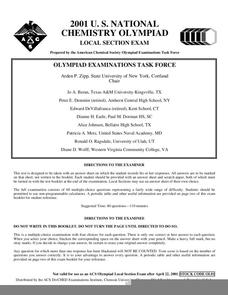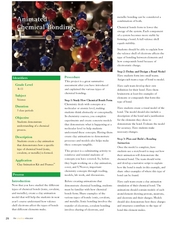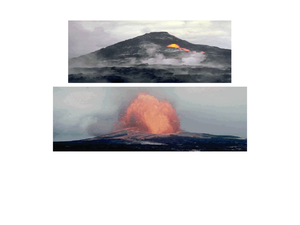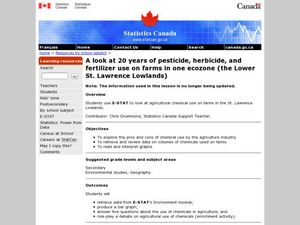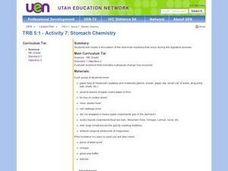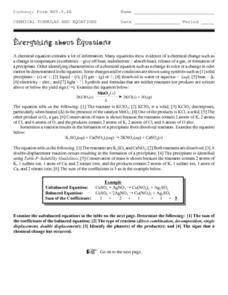American Chemical Society
Color Changes with Acids and Bases
Getting back to the beginning of the unit, learners use reactions with red cabbage juice to determine if solutions are acidic, neutral, or basic. This is a straightforward and classic investigation, but what you will appreciate is the...
Curated OER
2001 U.S. National Chemistry Olympiad - Local Section Exam
Sixty multiple-choice chemistry questions make up this comprehensive exam used for the 2001 US National Chemistry Olympiad. Every topic that you would expect to approach in a general chemistry class is queried on. You could easily use...
Curated OER
2000 U.S. National Chemistry Olympiad Local Section Exam
This 60-question comprehensive exam was designed to determine who would go on to compete in the 2000 US National Chemistry Olympiad. Hopefuls answer multiple choice questions regarding all chemistry topics taught in the first year...
Curated OER
2000 U.S. National Chemistry Olympiad National Exam - Part I
The National Chemistry Olympiad exams are comprehensive tests covering an entire year of chemistry concepts. You can use them as practice for competing in the challenge, or simply as a review, or as an actual final exam for your...
Scholastic
Study Jams! Energy & Matter
After Sam knocks a glass off the lunchroom table, he uses it as a springboard for explaining kinetic and potential energy. He mentions that sound is a type of kinetic energy and introduces the different forms of energy: thermal,...
Science Geek
Balancing Chemical Equations
Balancing equations means conserving mass; use the presentation to help learners practice this concept. The resource includes 56 equations for your class to practice balancing. Scholars focus on one reaction type at a time. Groups of...
Curated OER
Understanding Chemical Hazard Labels and MSDS
In this chemical hazard labels and MSDS worksheet, students read and interpret chemical hazard labels and MSDS. Then they use the documents given to respond to several questions about chemical hazard labels. Students identify the...
Curated OER
Animated Chemical Bonding
Young scholars demonstrate their understanding of a chemical process. In this exploratory instructional activity students create a clay animation that shows how a specific type of chemical bond.
Curated OER
Chemical Engineering: Volcanoes
Students study volcanoes using a chemical engineering project. In this volcanoes lesson, students create a model town and discuss the properties of a volcano. Students then make a volcano using a chemical engineering format for their...
Curated OER
Exploring the Physical and Chemical Properties of Polymers
Students identify the physical and chemical properties and explore the differences. In physical and chemical property instructional activity students test polymers for the differences between the physical and chemical properties,...
Curated OER
Effects of chemical use in Agriculture
Students research environmental data to create a bar graph. In this agricultural ecology instructional activity, students research the pros and cons of chemical use in farming. Students debate on passing a law to reduce chemical use.
Curated OER
Physical or Chemical- That Is the Question!
Young scholars differentiate physical and chemical changes. In this chemistry instructional activity, students give examples of each type of change. They take the review quiz at the end of the instructional activity.
Curated OER
Chemical Leavening Agents
Students examine chemical leavening agents in dough and batters.
Curated OER
ESL-Common Chemical Elements
In this ESL common chemical elements activity, students select the chemical elements represented by symbols given. Students may click on an answer button for immediate feedback.
Curated OER
Ziplock Chemistry
Students investigate various chemical reactions when creating mixtures in ziplock baggies. In this chemistry lesson, students will recognize various chemical reactions and cite evidence. Safety and assessment strategies are included in...
Curated OER
Changing Sugar
In this chemical and physical change worksheet, students use a sugar cube and observe its physical properties both when it is whole and after it is crushed. They heat the sugar cube and record 5 properties of the matter while being...
Curated OER
Activity #4 What Do Equations Mean?
Students practice with writing and balancing simple chemcial equations. they comprehend that chemical equations are a method of using a set of univeral symbols to represent what happens experimentally in chemical reactions. Pupils...
Curated OER
Boot Reer Root Beer
Fifth graders investigate chemical reactions. In this physical science lesson, 5th graders make dry ice root beer and identify the type of change that occurs to the root beer mixture.
Curated OER
Speeding up the Fizz
Students investigate temperature and chemical reactions. They explore the effect of temperature and particle size has on the rate of a simple chemical reaction. In addition, they graph their results and answer assessment questions.
Curated OER
The Scientific Method Using Mystery Powders
Students use the scientific method to determine physical and chemical properties of unknown substances. In this scientific method lesson plan, students discuss chemical and physical properties of substances as a class after a...
Curated OER
Stomach Chemistry
Fifth graders compare physical and chemical changes. They perform a simulation experiment/activity that replicates what happens in the stomach as food is digested by stomach acids.
Curated OER
Resource Sharing Between Chemistry Labs
Students assume the role of community college instructors researching the feasibility of resource (chemicals, supplies, equipment) sharing between community colleges. They explore safety issues pertaining to chemical transport, storage,...
Curated OER
Weathering Walk
In this weathering worksheet, students walk around campus and observe ten examples of both mechanical and chemical weathering. They answer questions related to their observations.
Curated OER
Everything about Equations
For this chemical reactions worksheet, students are given fifteen unbalanced equations and they must identify the reaction types, the phases of the products, the signs that a chemical change occurred and the sum of the coefficients of...
Other popular searches
- Household Chemicals
- Tobacco Chemicals
- Chemicals Reactions
- Hazardous Chemicals
- Kids and Chemicals
- Balancing Chemicals
- Chemistry, Harmful Chemicals
- Chemicals Human Health
- Research Food Chemicals
- Chemicals Environment
- Toxic Chemicals
- Chemicals in Cigarettes

